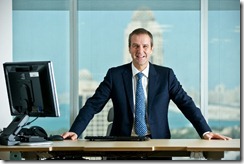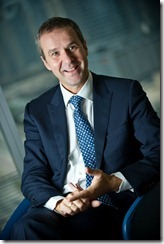A combination of international and regional developments over the past 12 months has prompted unprecedented changes in the business environment in the Middle East. In a wide-ranging discussion with Comm., Ericsson’s president for Region Middle East explains why the region remains a viable ICT hub, and how the years ahead are poised for strong growth
Anders Lindblad has been president of Region Middle East for Ericsson for about 18 months, in which time he has witnessed tremendous change within as well as externally to the telecom sector
Anders Lindblad has been Ericsson’s head of Region Middle East for about 18 months and within that time has seen some of the most significant social developments to have occurred in the Middle East for decades. Lindblad draws a parallel with the transformative effect that mobile communications has had in the past 20 years, and believes operators have to be attuned to where they want to be in the future and begin investing in that today.
“Voice is always going to remain a significant part of the mobile business,” Lindblad asserts. “However, we are also witnessing the entry of video and social media, which in a way is the continuation of the voice call in a multimedia setting,” he adds.
Hugely profitable SMS traffic is on the decline, and operators are required to focus on consumer needs in order to alter products and services in line with changing trends. This is where segmentation plays a crucial role in understanding the needs of end-users and addressing them.
Given these changing trends, Lindblad believes one of the most crucial elements operators need to cope with once they have made a technology choice is “when to flip the switch” with respect to introducing the networks and services commercially.
“Timing the transition to new technologies and services is very important,” Lindblad says. “At Ericsson we take particular care with our operator partners, not just to deliver the technology, but also to share when and how we believe these could come to market,” he adds.
This strong partnership drive has turned Ericsson into a leader in the provision of managed services, as it looks to problem solve and troubleshoot on behalf of and in cooperation with service providers across the globe. Earlier this year Ericsson’s president and CEO Hans Vestberg reiterated that managed services continues to be a large component of the company’s business, having entered into 54 new management services contracts in 2010.
The provision of hosted services is another area Ericsson has been involved in for some time, and as the offering evolves into the provision of cloud services Vestberg confirmed that he believed the company is well-placed to capture a significant proportion of this growth area also.
In the Middle East, Lindblad believes operators need to decide who they will be ten years from now and start making decisions now that will help them achieve that ambition. Ericsson has been pushing the vision of the ‘Networked Society’ in which any device that benefits from being connected to a network will be, and the evolving ecosystem to support this vision will mean that the role operators play will change as they climb up the value chain. This in turn will leave a growing opportunity for companies such as Ericsson to provide ever-expanding portfolios of managed services as operators concentrate on service provision.
Middle East regional note in Ericsson’s Q211 financial results
Middle East sales decreased -7% year-over-year and increased 16% sequentially. Political unrest continued to impact sales development in the region. Mobile broadband sales continued to develop positively across the region. Operators are looking into opportunities to reducing their operating expenses, resulting in a positive development for managed services both year-over-year and sequentially.
Source: Ericsson
“Innovation and flexibility are key going forward,” Lindblad states in reference to the challenge of service providers remaining relevant and secure despite the rapid changes taking place around them. Management of offerings and billing and charging also become crucial success factors in a mobile data environment and Lindblad explains that this was partly the rationale behind Ericsson’s purchase in June of OSS/BSS (operations and business support systems) specialist Telcordia.
Telcordia specialises in the development of mobile, broadband and enterprise communications software and services, with Ericsson stating at the time of the acquisition that the importance of operations and business support systems will continue to grow as more and more devices are connected, services become mobile and new business models for mobile broadband are introduced.
While uncertainty does still remain regarding the wider global economy, which thus has a knock-on effect on telecom investments, Lindblad believes that overall the economic downturn of the past few years has not been without its positives on the sector in the region. He believes that operators in particular have emerged from the crisis more resilient and more focussed on driving efficiency and cementing value-driven relationships with end-users.
“The impact of the general economic situation has led to all telecom players, vendors included, left asking what is happening in their businesses, and the only way to make progress from this is together,” Lindblad says. He also accepts that Ericsson has felt the knock-on effect of some softened demand in some parts of the region, while in others business remains brisk.
“For us at Ericsson, the emphasis is on trying to work smarter, and one of the big advantages of having such a long history is that we are able to predict more difficult times early and prepare for them,” Lindblad says.
The Middle East remains a fantastic balancing act between more, and less technologically advanced markets, and while voice remains the bread and butter of the regional telecom landscape, innovative providers abound. Just last month Mobily and STC in Saudi Arabia, and Etisalat in the UAE announced the launch of commercial LTE networks. Qatar Telecom also stated it had launched its LTE programme at the beginning of October, which it claimed will deliver the fastest and largest 4G network in Qatar.
The project will deploy nearly 900 base stations across the country, with implementation beginning immediately.
Lindblad believes that operators need to decide who they will be ten years from now and start making decisions now that will help them achieve that ambition
The programme will provide ongoing improvements to mobile broadband Internet services for customers in 4G coverage areas, and offer potential download speeds of up to 150Mbps on mobile devices.
“In our region growth in network traffic is being driven by data,” Lindblad says. “We are trying to work very closely with operators to manage these developments and believe that basic infrastructure needs to be shared, such as in the case of optical backbones, for example.”
Away from service providers, Ericsson is also working closely with enterprises to enhance their IT and communications functions. Early this year Ericsson entered into a five-year IT management contract with UAE telco Du. As part of the managed services agreement, Ericsson agreed to augment Du’s IT applications and deliver development and maintenance for the UAE telco’s IT applications.
Then in August, Ericsson announced the signing of a Memorandum of Understanding (MoU) with Pacific Controls, a Dubai-based ICT enabled software developer and provider of global total automation solutions, to jointly develop ICT enabled smart solutions for vertical industry sectors. With the combined efforts and experience of both companies, Ericsson and Pacific Controls will enable customers to offer smarter services and products to their end-users.
The agreement calls for Ericsson and Pacific Controls to jointly cater to the business needs of sectors such as energy, utilities and certain areas of government. With Ericsson as the global leading provider of telecom technology and services and its consulting and systems integration capabilities combined with Pacific Controls’ expertise in the fields of energy management, remote monitoring, controlling and M2M (machine-to-machine) applications, customers will be able to cut their costs, increase their revenues and enhance their overall productivity.
Overall, Lindblad sees the business trend in the Middle East’s telecom sector as being very positive, though that is not to say agility and a strong commitment is not required in order to succeed. An area that Ericsson continues to pay significant attention to is the recruitment of talented individuals from the region to whom skills and competence can be transferred.
“We are looking at the attrition rate, as it is our aim to keep staff longer,” Lindblad comments. “It is important to have competent organisation in regional markets, staffed by people from those markets, and that is something we work hard to achieve,” he adds.





0 comments ↓
There are no comments yet...Kick things off by filling out the form below.
Leave a Comment